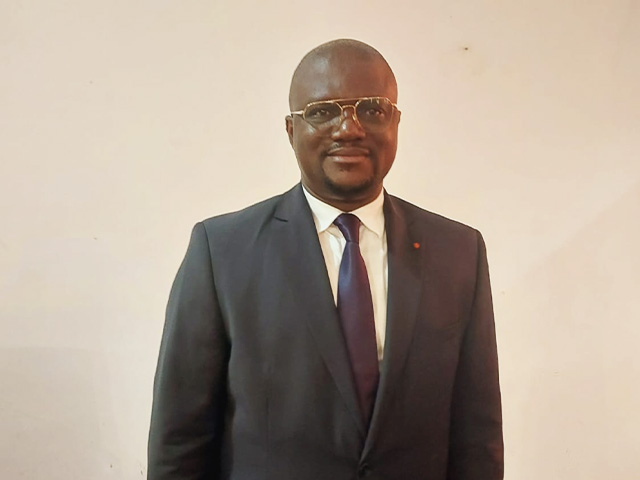In Gabon where the first days of the economy of pharmaceutical establishments were held for two days, Gabonreview met the president of the Interunion of Pharmacists of Africa (Ispharma). During this work where, beyond sharing experience, pharmacists rethought their economic model, particularly analyzing the issues, challenges and the impact of health insurance on this environment, Dr Kanigui Hyacinthe Ouattara assured that the Health insurance represents on average 30% of pharmacies’ turnover. Below is our interview.
Dr Kanigui Hyacinthe Ouattara speaking at the opening of the days. © Gabonreview
Gabonreview: Before being president of Ispharma, you are first and foremost a community pharmacist. Can you tell us in a few words what your specialty is?
Dr. Kanigui Hyacinthe Ouattara : And president of the National Union of Pharmacists of Ivory Coast as well. The community pharmacist is simply a pharmacist who has the pharmaceutical skills for the health care of different populations. Our role is to enable the dispensation of medicine to different populations through advice but also through the execution of prescriptions from different doctors or prescribers.
Dr. Kanigui Hyacinthe Ouattara. © Gabonreview
How are pharmacies doing in Africa?
Better and better. I believe that pharmacy has a history in our different countries which dates from the beginning of independence. For most of our orders in the different countries covered by Ispharma, we inherited the legislation of the colonizer, mainly France. For some time now, these texts have begun to be brought up to date to reflect our realities. We are very happy because there is development in terms of pharmaceutical regulations in our different countries.
Moreover, we have put in place a certain number of elements. In particular, the African Medicines Agency which is today led by the special envoy of the AU, Michel Sidibé, with whom we work. The objective is to be able to set up pharmaceutical regulatory agencies in each country, which are independent administrative authorities, for better management of the pharmaceutical sector. Before, most of the organizations that managed the pharmacy were central directorates of the Ministry of Health and there were limits. We are gradually getting there.
Pharmacists talk about health insurance a lot. What is its impact on the operation of pharmacies?
A study has not been carried out on a continental scale, but in different countries, in Ivory Coast for example, health insurance represents at least 30% of pharmacies’ turnover. And in certain highly urbanized areas, there are pharmacies which charge up to 80% of their turnover through third-party payment. So you understand today why we insist that this aspect can work correctly. Increasingly, with the implementation of universal health coverage which is compulsory health insurance in our different countries, it goes without saying that this proportion will increase further since it is the entire population which will be concerned with the generalization of the third party country. For us, it is important that practices at the level of third-party payment organizations are well regulated so that everyone can play their part.
How do you define a pharmacist: trader or doctor? What is its role in society?
We are not doctors but pharmacists. Our activity is commercial. If we say that we are traders, it is not pejorative: it is the reality. We carry out acts of commerce. But it is a business that is regulated and that is the most important thing: we have a Code of Ethics, laws on the practice of pharmacy. The pharmacist in the daily exercise of his profession incurs three responsibilities: civil, criminal and disciplinary. It also includes the responsibility of all its employees and also of all those under its authority. We therefore cannot do what we should not do. The pharmacist is trained, he has skills and he acts in strict compliance with his skills. This is why we have disciplinary chambers to resolve conflicts or defects that may exist in our practice.
You arrived in Gabon for the first days of the economy of pharmaceutical establishments, what is the opportunity for such a meeting?
It is already to come and support our colleagues from Gabon, who are members of Ispharma. The other thing is sharing experiences. I am accompanied by my secretary general of Ispharma who is from Mali. This is really so that the different recommendations that we take at the forum level, we can put all the member countries of Ispharma at the same level of information so that we can move forward together.
What is the summary business card of Ispharma?
Ispharma is the Interunion of Pharmacists of Africa. Its objective is to bring together all the unions of the member countries. Today, there are around 25 member countries and with Ispharma we have been able to help certain countries move forward.
Similar articles
2024-01-21 18:32:59
#Health #insurance #represents #pharmacy #turnover #reveals #president #Ispharma #Gabonreview.com #News #Gabon
